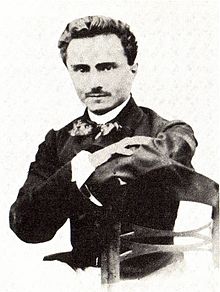Ippolito Nievo
Ippolito Nievo (born November 30, 1831 in Padua , † March 4, 1861 in the Tyrrhenian Sea in a shipwreck) was an Italian writer.
Life
Nievo was born the son of the Mantuan civil servant Antonio Marin and the noblewoman Adele Marin. His maternal grandfather, Carlo Marin, was a Venetian patrician with voting rights in the Grand Council of the Republic of Venice during its fall.
From 1841 Nievo attended the Catholic seminary of Sant'Anastasia in Verona . He then took lessons at private high schools in Cremona and Revere and passed the Abitur in 1850. After returning to his native Mantua, Nievo enrolled in the law faculty in Pavia and began his law degree there in 1852, which he completed in 1855 after moving to the University of Padua.
Disappointed by the political situation in Italy, which was still partly occupied by foreign powers such as Austria or Spain and divided into many principalities, Nievo went to Colloredo di Montalbano in 1855 and began his first work on his masterpiece Le confessioni d'un Italiano ( German: "The Confessions of an Italian"). In addition, Nievo also worked as a journalist, for example for the weekly newspaper Il Caffè . In 1856 Nievo had to submit to a court case in Milan because of his story L'Avvocatino , published in the Milan newspaper Il Panorama universale . After returning to Colloredo di Montalbano in 1857, Nievo went back to writing the historical novel Le confessioni d'un Italiano , which he completed in 1858, and in which he campaigned for the Italian Risorgimento movement, which was a unified Italian nation-state wish. However, the work was not published until 1867 after Nivo's death under the title Le Confessioni di un ottuagenario ( Eng .: “The confessions of an eighty- year-old ”).
Nievo also actively fought as a soldier for the Italian national movement. Since 1859 he took part in the regiment of the Cacciatori delle Alpi (German: "Alpenjäger") on the side of Giuseppe Garibaldi in the second Italian War of Independence and was also one of the volunteers from the famous Train of Thousands that landed in Sicily in 1860 under Garibaldi . On March 4, 1861, he embarked on the old steamship Ercole for Naples , but it never reached the port, so the exact circumstances of Nievo's death remain in the dark.
Works
Letters
- Le lettere a Matilde Ferrari , 1848–1851
Poems
- Versi , 1854
- Le Lucciole. Canzoniere , 1858
- Gli Amori Garibaldini , 1860
Political Writings
- Venezia e la libertà d'Italia , 1859
Novels and short stories
- Afrodisiaco per l'amor platonico , 1851, published posthumously 1956
- La nostra famiglia di campagna , 1855
-
Il Varmo , 1856
- On the banks of the Varmo. Village stories . Vienna / Bozen: Folio Verlag 2015, ISBN 978-3-85256-578-1
-
Angelo di bontà. Storia del secolo passato , 1856
- Translated by Otto Borchers: Ein Engelsherz , Grunow, Leipzig 1877
- Übers. Barbara Kleiner : An angel in goodness. Story from the past century . Manesse, Zurich 2010, ISBN 978-3-7175-2174-7 .
-
Le confessioni d'un Italiano , 1857/58, published posthumously 1867 as Le confessioni di un ottuagenario
- Übers. Isolde Kurz : Memories of an eighty year old . 2 volumes. Leipzig 1877
- Translated from Charlotte Birnbaum: Pisana or the confessions of an eighty-year-old. Insel, Frankfurt 1956
- Translator Barbara Kleiner: Confessions of an Italian. 2 volumes. Manesse, Zurich 2005
- La storia filosofica dei secoli futuri , 1860
literature
- Constantin von Wurzbach : Nievo, Ippolito . In: Biographisches Lexikon des Kaiserthums Oesterreich . 20th part. Kaiserlich-Königliche Hof- und Staatsdruckerei, Vienna 1869, p. 351 ( digitized version ).
Web links
- Literature by and about Ippolito Nievo in the catalog of the German National Library
- Biography on italialibri.net (ital.)
- Works by Ippolito Nievo Text, concordances, word lists and statistics (ital.)
notes
- ↑ In 2007 in Straelen, the critic Denis Scheck went into detail about the work and the translation achievement in a greeting to Kleiner for the Straelen Translator Award from the Kunststiftung NRW .
| personal data | |
|---|---|
| SURNAME | Nievo, Ippolito |
| BRIEF DESCRIPTION | Italian author |
| DATE OF BIRTH | November 30, 1831 |
| PLACE OF BIRTH | Padua |
| DATE OF DEATH | March 4, 1861 |
| Place of death | Tyrrhenian Sea in a shipwreck |
